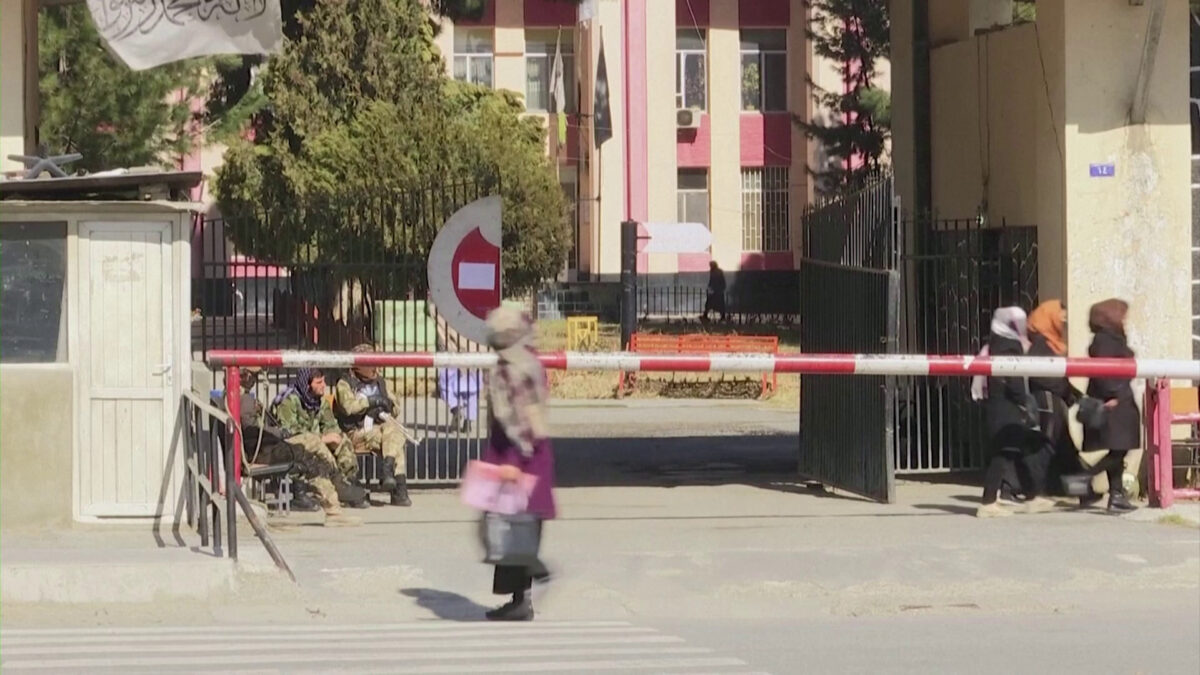In the midst of a global outcry against the Taliban, for banning women from getting a university education, the group’s minister of higher education on Thursday night outlined their reasons for the shock move.
In the midst of a global outcry against the Taliban, for banning women from getting a university education, the group’s minister of higher education on Thursday night outlined their reasons for the shock move.
In an interview with RTA – the Taliban-run TV channel – he said the group’s leadership had taken the decision as universities had not followed through on the Taliban’s instructions over the past 14 months.
He said female students failed to abide by the full hijab law; that female students living in dormitories were unaccompanied and had no male relative with them; and that co-education classes continued.
Nadim also said that of the 160 subjects taught at universities, many were in contravention of Islam and “Afghan dignity”, therefore the Taliban leadership decided to suspend higher education for girls and women.
Following Wednesday’s decision, the international community, both governments and organizations, as well as Islamic nations have slammed the decision by the Taliban and most have called on the group to reverse the ruling.
Taliban’s move to ban women from universities sparks global outcry
The Taliban’s decision to ban women from attending universities across Afghanistan has sparked a widespread outcry both in the country and abroad.
On Tuesday, the Taliban’s ministry of higher education issued a memo ordering universities to stop providing an education to females “until further notice”.
UN Secretary General Antonio Guterres said in a statement that he is “deeply alarmed by news reports that the Taliban have suspended access to universities to women and girls.”
According to Guterres, the denial of education not only violates the equal rights of women and girls but will have a devastating impact on the country’s future.
He urged the “de facto authorities” of Afghanistan to “ensure equal access to education at all levels for women and girls.”
US Secretary of State Antony Blinken said he is “deeply dismayed by the announcement from the Taliban denying women the right to a university education.”
“Afghan women deserve better. Afghanistan deserves better. The Taliban have just definitively set back their objective of being accepted by the international community,” he said.
“Incomprehensible. Indefensible. Anti-Islamic. These are the words being used to describe the Minister of Higher Education’s decree suspending education for Afghan girls. The men who made this decision are driving Afghanistan further into poverty,” US Chargé d’Affaires Karen Decker said.
“Calling on Afghan men to stand up with Afghan women. Now is the time. What are you waiting for?” she said.
The US Department of State said it “condemns in the strongest terms the Taliban’s indefensible decision” to ban women from universities, keep secondary schools closed to girls, and continue to impose other restrictions on the ability of women and girls in Afghanistan.
“The Taliban cannot expect to be a legitimate member of the international community until they respect the rights of all in Afghanistan,” the statement reads. “This decision will come with consequences for the Taliban.”
The State Department said that no other country in the world bars women and girls from receiving an education.
The Foreign Ministry of Qatar in a statement expressed concerns over the banning of women and girls from going to schools.
“As a Muslim state where women enjoy all due rights, particularly education, the State of Qatar calls on the Afghan caretaker government to review its decision in line with the teachings of the holy religion of Islam regarding women’s rights,” the statement reads.





